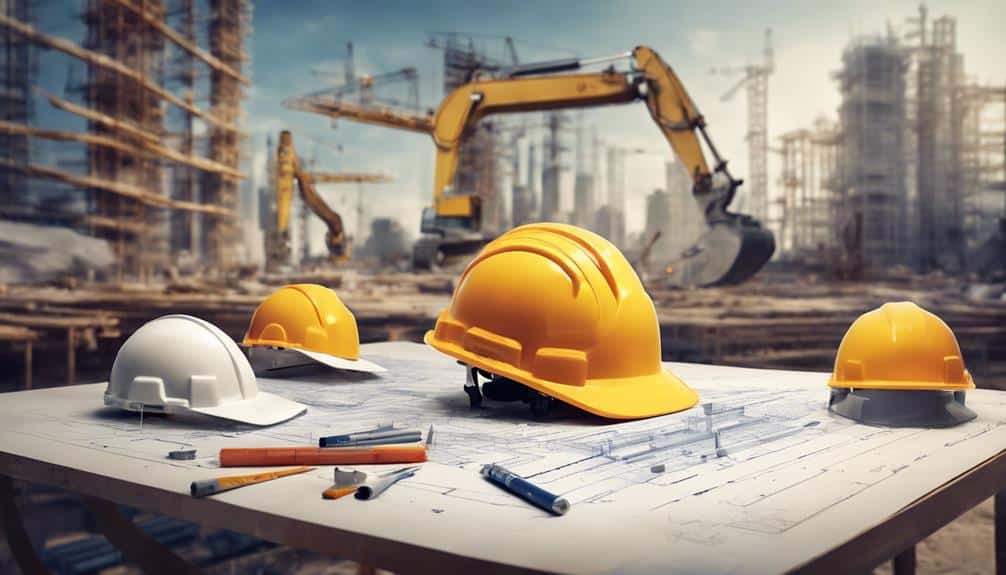As a construction project manager, you're in charge of overseeing complex projects from start to finish. This means navigating a web of timelines, budgets, and stakeholders.
To succeed, you need to get a handle on the intricacies of project management.
You need to master planning and scheduling, risk management, and team leadership. But where do you even start? What skills and strategies do you need to ensure your projects are completed on time, within budget, and to the desired quality?
Let's dive into the critical duties of a construction project manager.
What does it take to deliver successful projects that exceed expectations?
Understanding Project Management Fundamentals
Project management is a deliberate and structured approach to achieving specific goals and objectives. It involves initiating, planning, executing, monitoring and controlling, and closing a temporary endeavor.
As a project manager in construction project management, your role is to oversee the entire project lifecycle. Effective communication is vital to ensure that all stakeholders are informed and aligned with project goals.
You need to identify and mitigate risks, allocate resources efficiently, and establish quality standards to guarantee successful project management.
Your role involves developing a detailed project plan, setting realistic timelines, and allocating resources to achieve project objectives. Then, you'll need to monitor progress, identify potential roadblocks, and adjust plans accordingly.
By understanding these project management fundamentals, you'll be well-equipped to navigate the complexities of construction project management and deliver high-quality results that meet stakeholder expectations.
Mastering Planning and Scheduling
Mastering planning and scheduling is crucial for delivering construction projects on time, within budget, and to the required quality standards. As a construction project manager, you know that these two elements are the backbone of successful project execution.
So, how do you create a robust project schedule?
First, define your project objectives, scope, and timelines. Then, break down complex tasks into manageable chunks, and allocate resources accordingly. Don't forget to identify and mitigate risks through proactive risk management strategies.
Next, develop a thorough project plan that outlines project progress milestones, deadlines, and key performance indicators.
This will enable you to track progress, identify bottlenecks, and make data-driven decisions to get the project back on track. Remember, a well-planned project schedule is essential to achieving project objectives and meeting stakeholder expectations.
Effective Communication Strategies
Effective communication is key to successful construction project management. It helps teams collaborate, keeps stakeholders on the same page, and enables quick resolution of issues that could impact project timelines and budgets.
As a project manager, you need to develop effective communication strategies to ensure all stakeholders are informed and aligned with project goals and timelines. This means using a mix of verbal, written, and visual communication methods to convey complex information in a clear and concise way.
Active listening is also crucial. You need to be attentive, empathetic, and non-judgmental when interacting with stakeholders, team members, and contractors.
Regular meetings and progress updates are necessary to identify and address potential issues promptly. Technology can facilitate communication and collaboration, including project management software, collaboration tools, and other digital platforms that enable real-time communication and data sharing.
Risk Management and Mitigation
When construction projects get more complex, the chances of unexpected events derailing timelines and blowing budgets increase.
That's why it's crucial to have a proactive risk management and mitigation strategy in place to ensure project success.
To do this, you need to identify potential risks associated with your construction project.
Then, you develop mitigation strategies to minimize their impact.
Effective risk management involves identifying potential risks, evaluating their likelihood and potential impact, and creating contingency plans to mitigate potential losses.
By identifying potential risks upfront, you can minimize potential losses and keep your project on track.
This involves developing mitigation strategies that address specific risks, such as weather-related delays or material shortages.
You should also establish contingency plans to address unforeseen events, ensuring that your project can adapt to changing circumstances.
By prioritizing risk management and mitigation, you can minimize the likelihood of project delays and cost overruns.
This guarantees your construction project is completed on time and within budget.
Leading and Managing Construction Teams
To lead and manage a construction team, you need strong organizational, communication, and problem-solving skills to guide your team towards project goals and deadlines. As a project manager, you play a vital role in facilitating the successful completion of a construction project.
When managing a team, it's essential to strike a balance between giving them autonomy and providing oversight. You want to empower your team members to take ownership of their work while maintaining accountability and direction. This balance is crucial to getting the job done efficiently.
Clear and concise communication is key to a project's success. You need to communicate effectively with all stakeholders, including team members, clients, and vendors. This ensures everyone is on the same page, and potential issues are addressed promptly.
A positive and inclusive work environment is vital to team productivity. You should foster an atmosphere that promotes collaboration, trust, and open communication among team members. This leads to a more cohesive team that's motivated to deliver their best work.
To boost team morale, motivation, and productivity, set realistic goals, provide training and support, and recognize individual contributions. This approach helps team members feel valued and motivated to achieve their goals.
As a leader, it's essential to lead by example. Demonstrate a strong work ethic and commitment to excellence. This inspires your team to follow your lead and strive for excellence in their work.
Frequently Asked Questions
What Is the Role of Project Management in Construction?
So, what does a construction project manager do? Well, they're in charge of the entire project from start to finish. This means they develop a strategy for getting the construction job done, make sure everyone follows the rules, and build a positive team atmosphere.
They also have to identify and deal with potential problems that could slow down the project or cost too much money. This means talking to people involved in the project, like architects, engineers, and city officials, to make sure everyone is on the same page.
A big part of the job is managing the project's budget and schedule. This means making sure the project is finished on time and doesn't cost more than it's supposed to. The project manager also has to make sure the quality of the construction work is good and that the right people and materials are used. Finally, they have to communicate effectively with everyone involved in the project, making sure everyone knows what's going on and what's expected of them.
What Does Masters in Project Management Do?
When you pursue a Master's in Project Management, you'll gain expertise in a variety of areas.
You'll learn how to coordinate projects effectively, allocate resources wisely, and manage stakeholders' expectations. You'll also develop skills in risk analysis, team leadership, and budget planning.
Additionally, you'll understand how to develop schedules, manage change, control quality, and communicate strategies effectively.
Ultimately, you'll be equipped to manage projects from start to finish with confidence and expertise.
What Is the Job Description for a Construction Project Manager?
As a construction project manager, you're the one in charge on the construction site. Your day is filled with site visits, where you get to see firsthand how the project is progressing.
You're also a leader, responsible for guiding your team towards a common goal. This means you need to be able to motivate and direct your team members to get the job done.
On top of that, you're in control of the budget. You need to make sure that the project is financially viable and that you're not overspending. This means making tough decisions about where to allocate resources.
Speaking of resources, you're also in charge of managing timelines. You need to create schedules, set deadlines, and make sure that everything is completed on time.
But it's not just about getting the job done; it's also about getting it done right. You're responsible for making sure that the quality of the work is up to par. This means implementing quality control measures and making sure that everyone on the team is meeting the required standards.
Of course, no project is complete without stakeholders. You'll need to engage with them regularly, keeping them informed of progress and addressing any concerns they might have.
Risk is always a factor in construction, so you'll need to identify potential risks and develop strategies to mitigate them.
What Are the Duties and Responsibilities of a Project Manager?
So, what does a project manager do? Well, for starters, they're responsible for managing risk. That means identifying potential problems and figuring out how to mitigate them. They also lead teams, which involves guiding and directing team members to ensure everyone is working towards the same goal.
Next, project managers plan budgets. This involves allocating financial resources to different aspects of the project to ensure it's completed within budget. They also engage with stakeholders, which means communicating with people who have an interest in the project, such as customers, sponsors, or investors.
In addition to these duties, project managers control schedules, allocating resources, and guaranteeing quality assurance. This means creating timelines, assigning tasks, and ensuring the project is completed on time and to a high standard.
Another key responsibility is developing communication strategies. This involves creating plans for how the project will be communicated to stakeholders and ensuring that everyone is on the same page.
Project managers also manage changes to the project scope or plan, which involves assessing the impact of changes and implementing them in a way that minimizes disruption.
Conclusion
As you manage your construction project, you're working towards a successful outcome.
You've laid a solid foundation by planning, scheduling, and managing risks.
Your team is working together seamlessly, thanks to effective communication and leadership.
You're making data-driven decisions to navigate the complex construction project management landscape.
Now, you're close to achieving the final goal – delivering a successful project that will stand the test of time.




